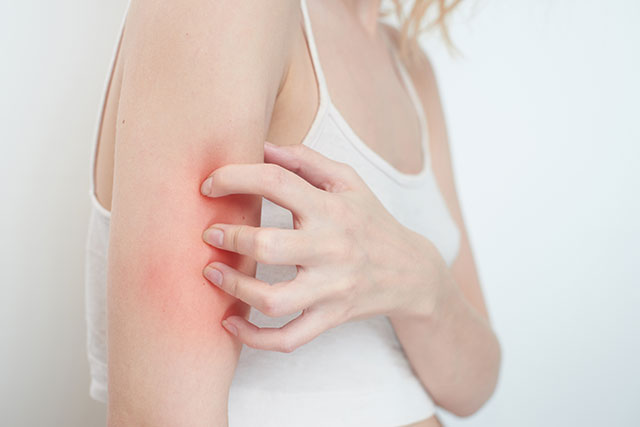Study: Excess iron may increase your risk of developing bacterial skin infections
02/23/2020 / By Darnel Fernandez

Iron is an essential mineral that plays a key role in producing hemoglobin — a complex protein that carries oxygen from the lungs to the rest of the body. Aside from that, this mineral also has a wide variety of other beneficial effects on overall health, including eliminating fatigue, improving muscle strength, preventing anemia and supporting the immune system. However, like all other nutrients, recent research suggests that too much iron can be harmful to your skin health.
A study published in the journal PLOS Medicine found that high iron levels can lead to an increased risk of developing bacterial skin infections. This global study is the first to use large-scale population data to investigate this association.
“We used a statistical method, called Mendelian randomization, that employs genetic data to better estimate the causal effect of iron status on 900 diseases and conditions,” Beben Benyamin, the study’s co-lead author, said. “Through this, we found a link between excess iron and a reduced risk of high cholesterol,” Benyamin added.
The dark side of iron
While there is plenty of research available that highlights the positive effects of iron consumption in the body, there aren’t many studies that look into the negative effects of excess iron. In this global study, researchers from the University of South Australia, in collaboration with Imperial College London and the University of Ioannina in Greece, explored the broad clinical effects of varying iron status.
To do so, the researchers used the genetic and clinical data from around 424,439 people, aged 40 to 69, who are enrolled in the U.K. Biobank. The researchers claim that their study was able to rapidly determine the effects of raised iron status on hundreds of clinical outcomes using data that has been already captured. From their analysis, they were able to document the positive effects of iron — namely its ability to protect the body against anemia and reduce the risk of high cholesterol.
Anemia refers to a condition wherein there are not enough healthy blood cells to circulate the oxygen throughout the body. According to the World Health Organization, anemia affects about 1.62 billion people worldwide, which is equivalent to 24.8 percent of the population.
However, the researchers also revealed that excessively high iron levels can also increase your risk of developing bacterial skin infections like cellulitis. (Related: Iron supplements cause more harm than good.)
Although there are previous trials that manipulated iron status in people with anemia, none of them so far have focused on managing skin infections or regulating cholesterol using iron levels. The researchers believe that they need significantly more trial data before even attempting iron manipulation.
“In this study, we have provided population-based evidence that iron is associated with certain diseases. The next step is to investigate whether direct manipulation of iron levels improve health outcomes through clinical trials,” said Benyamin.
Natural ways to treat a bacterial infection
The common trend nowadays is to use antibiotics to handle bacterial infections. However, there is a growing concern that these bacteria can develop resistance to the antibiotic medicine recommended by most health experts. Thankfully, there are natural remedies available that have been used for years to treat various skin bacterial infections
- Aloe vera. This plant has antibacterial and anti-inflammatory properties, making it a fantastic remedy for any skin condition, especially bacterial skin infection. You can apply freshly extracted aloe vera gel directly on the affected areas of the skin then leave it for a few hours before rinsing with water. Repeat this process regularly 2 to three times a day.
- Turmeric. This spice is famous for the variety of health benefits it provides, such as its potent anti-inflammatory properties. This is all thanks to turmeric’s active ingredient, curcumin, which exhibits antibacterial, anti-inflammatory and antioxidant properties which are essential in fighting bacterial infections. You can create a paste-like substance by mixing water and freshly ground turmeric. Then, apply this paste on the affected areas of skin and let it sit for a few minutes before rinsing off with water.
- Tea tree oil. This essential oil has powerful anti-bacterial properties that help you treat a wide variety of skin infections. Pour a few drops of this essential oil in coconut oil before applying the mixture on the bacteria affected skin.
- Garlic. This kitchen staple contains a compound called allicin that works effectively in treating bacterial infections. For skin infections, you can apply a bit of garlic oil directly on the affected skin and massage gently for a few minutes to ensure absorption and equal application.
Nutrients.news has everything you need to know about iron and other minerals.
Sources include:
Submit a correction >>
Tagged Under:
aloe vera, anemia, bacterial infections, Essential Minerals, excessive iron, garlic, infections, iron, iron deficiency, minerals, Natural Treatments, nutrients, skin care, skin health, supplements, Tea Tree Oil, turmeric
This article may contain statements that reflect the opinion of the author
RECENT NEWS & ARTICLES
Infections.News is a fact-based public education website published by Infections News Features, LLC.
All content copyright © 2018 by Infections News Features, LLC.
Contact Us with Tips or Corrections
All trademarks, registered trademarks and servicemarks mentioned on this site are the property of their respective owners.





















